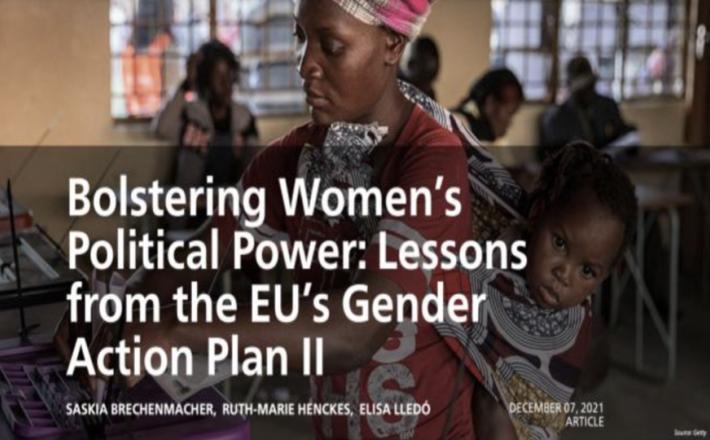Bolstering women’s political power: lessons from the EU’s Gender Action Plan II
Source: Carnegie Europe
In December 2020, the European Commission released its third Gender Action Plan (GAP III), which lays out how the European Union should promote gender equality in its external relations over the following five years. Just like its predecessor, the new plan highlights women’s equal political voice and participation as one of the EU’s central gender-equality priorities.
The EU’s renewed commitment to women’s equal political participation comes at a critical time. Globally, the COVID-19 pandemic and the resulting economic fallout have deepened existing gender inequities. At the same time, women in most societies—including in the EU—remain woefully underrepresented in political decisionmaking, particularly at the highest levels. Their continued marginalization violates women’s rights to equal political citizenship and representation. It also weakens the legitimacy and effectiveness of democratic institutions: women bring distinct policy priorities to the table and raise the likelihood that political decisions respond to the needs of all citizens, including women and girls.
Click here to read the full article published by Carnegie Europe on 6 December 2021.

In December 2020, the European Commission released its third Gender Action Plan (GAP III), which lays out how the European Union should promote gender equality in its external relations over the following five years. Just like its predecessor, the new plan highlights women’s equal political voice and participation as one of the EU’s central gender-equality priorities.
The EU’s renewed commitment to women’s equal political participation comes at a critical time. Globally, the COVID-19 pandemic and the resulting economic fallout have deepened existing gender inequities. At the same time, women in most societies—including in the EU—remain woefully underrepresented in political decisionmaking, particularly at the highest levels. Their continued marginalization violates women’s rights to equal political citizenship and representation. It also weakens the legitimacy and effectiveness of democratic institutions: women bring distinct policy priorities to the table and raise the likelihood that political decisions respond to the needs of all citizens, including women and girls.
Click here to read the full article published by Carnegie Europe on 6 December 2021.